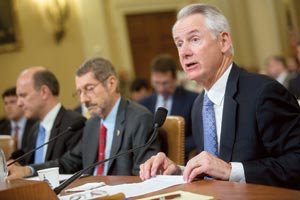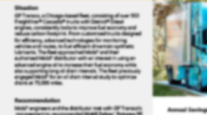Senior Reporter
Graves Urges Fuel-Tax Hike

This story appears in the June 22 print edition of Transport Topics.
WASHINGTON — American Trucking Associations President Bill Graves again told lawmakers that raising federal fuel taxes is the best approach for paying for infrastructure projects, a position congressional leaders charged with uncovering more funding reject.
At a high-profile House Ways and Means Committee hearing June 17, Graves told the panel that infrastructure needs are constantly mounting and revenue from a fuel tax was among the most efficient ways to back fixes.
“Roads and bridges aren’t free, and they’re certainly not cheap, yet Congress has been operating under the assumption that pennies might fall from heaven,” said Graves, a former two-term Republican governor of Kansas.
At the hearing, Ways and Means Chairman Paul Ryan (R-Wis.) said he did not support a fuel-tax increase, adding that a transfer this summer from the general Treasury fund to the Highway Trust Fund — essentially a short-term extension — seems unavoidable.
“It’s going to be difficult to reach consensus on a permanent solution,” Ryan said. “We are not going to raise the gas tax.”
According to the Congressional Budget Office, the trust fund is projected to run dangerously low in a couple of months. Since 2008, Congress has approved the transfer of about $62 billion from the general fund to ensure the trust fund’s solvency.
Graves said ATA supports two bills introduced this year by Reps. Earl Blumenauer (D-Ore.) and Jim Renacci (R-Ohio). Blumenauer’s measure would add 15 cents phased in over three years to the existing 18.4-cent gasoline tax and the 24.4-cent diesel tax. Those federal taxes have not been raised in two decades.
Renacci’s bill would establish a bipartisan, bicameral transportation commission charged with identifying a way to come up with a sustainable funding source for the trust fund.
Neither measure has been considered by committees.
The trucking industry is among several stakeholders that support raising the fuel taxes to pay for big-ticket infrastructure projects.
ATA and other stakeholders also are calling on Congress to avoid approving a short-term funding extension for transportation programs this summer, warning that doing so would disrupt states’ ability to plan long term for highway construction projects.
“Almost any policy you adopt that supports a multiple-year program and can be relied upon in the future, we will support. The consequences of inaction are just too great,” Graves said.
Before the House hearing, Blumenauer held a press conference where he urged the GOP-led Congress to approve a long-term funding plan for infrastructure projects.
“We’re not keeping up our end of the bargain for the 50% of capital spending on big projects that comes from the federal government. We haven’t made any meaningful adjustment since 1993 to the gas tax, relying on short-term fixes, gimmicks — and no matter how you slice it, adding to the deficit,” Blumenauer said.
At Blumenauer’s event, ATA Executive Vice President Dave Osiecki endorsed the Oregon Democrat’s push for a long-term bill.
“Congress’ action or inaction on this issue has real consequences,” Osiecki said. “Decisions on highway funding will determine whether some businesses succeed or fail and whether jobs are created or eliminated. And, most importantly, highway funding decisions will determine the safety of the motoring public as well as the safety and efficiency of the trucking industry, including the millions of professional drivers operating daily on our highway system.”
Also testifying at the June 17 hearing was Robert Poole of the Reason Foundation, who asserted that lawmakers should not depend on fuel taxes. Rather, he said, the federal government should shift to linking the transportation system to the amount that people spend driving.
The libertarian think tank has consistently called for minimizing the federal role in transportation, and it argues that tolling drivers along interstate highways would help states come up with the additional funding they need to repair aging infrastructure.
In most cases, the trucking industry opposes tolls.
The next day, Sen. Orrin Hatch (R-Utah) echoed Ryan’s sentiment, saying he thought it would be difficult to pass a fuel-tax increase.
“While I know the idea has some support, I don’t think a massive increase in the gas tax could be enacted into law,” Hatch, chairman of the Senate Finance Committee, said at a hearing. He added he is committed to coming up with a long-term funding plan for highway programs this year.
Former Transportation Secretary Ray LaHood, co-chairman of the infrastructure advocacy group Building America’s Future, spoke before the Senate panel and also urged senators to consider increasing fuel taxes.
“Our transportation system is broke,” LaHood said. “[I] don’t think anything should be off the table.”
During LaHood’s tenure with the Obama administration, he did not advocate for a fuel-tax increase.
Ryan’s committee also announced that a subcommittee on select revenue measures plans to convene a hearing on June 24 that explores funding options for a highway bill by taxing U.S. companies’ earnings held overseas.




